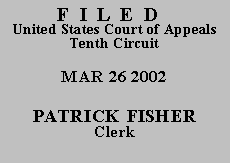 UNITED STATES COURT OF APPEALS
UNITED STATES COURT OF APPEALS
 UNITED STATES COURT OF APPEALS
UNITED STATES COURT OF APPEALS
| HENRY J. DAVIS,
v. BOBBY BOONE, Warden, |
No. 01-7036
(No. 00-CV-203-S) |
In his § 2241 petition, Davis seeks relief on the basis that his sentence violates international treaties, the orders in Battle v. Anderson, 708 F.2d 523 (10th Cir. 1983), 42 U.S.C. § 1981, and various provisions of the United States Constitution. On October 31, 2000, his petition was dismissed for failure to exhaust state court remedies. On January 5, 2001, the district court denied a timely-filed Fed. R. Civ. P. 59(e) motion for rehearing. Because the motion tolled the thirty-day period for filing a notice of appeal, see Fed. R. App. P. 4(a)(4)(A)(iv)(v), Davis had until February 5 to appeal the district court's dismissal of his § 2241 petition.(1) This he did not do.
Instead, on February 16, 2001, Davis filed a motion under Fed. R. Civ. P. 60(b) seeking leave to reopen. The district court denied that motion on February 22, 2001, and Davis filed his notice of appeal on February 28, 2001. Under these circumstances, petitioner's "appeal from the denial of the [Rule 60(b)] motion raises for review only the district court's order of denial and not the underlying judgment itself." Van Skiver v. United States, 952 F.2d 1241, 1243 (10th Cir. 1991).
In order to grant a certificate of appealability, we must conclude that Davis "has made a substantial showing of the denial of a constitutional right." 28 U.S.C. § 2253(c)(2); see also Montez v. McKinna, 208 F.3d 862, 867 (10th Cir. 2000) (holding that state prisoners must obtain a certificate of appealability to appeal denials of 28 U.S.C. § 2241 petitions). Davis fails to make such a showing. "We review a lower court's grant or denial of a Rule 60(b) motion for abuse of discretion." Plotner v. AT&T Corp., 224 F.3d 1161, 1174 (10th Cir. 2000). We have held that a district court has "substantial discretion" in considering Fed. R. Civ. P. 60(b) motions, and that "we will reverse the district court's determination only if we find a complete absence of a reasonable basis and are certain that the district court's decision is wrong." Id. (quotation omitted).
In his Rule 60(b) motion, Davis broadly alleged that his failure to exhaust state remedies should be ignored because all state remedies were inadequate. The motion falls short of meeting Davis's "burden of showing that he has exhausted available state remedies," or of "affirmatively show[ing] that resort to them would be useless." Miranda v. Cooper, 967 F.2d 392, 398 (10th Cir. 1992). Consequently, the district court did not abuse its discretion in denying the motion.
Davis's application for a certificate of appealability is DENIED, and this matter is DISMISSED. The mandate shall issue forthwith.
ENTERED FOR THE COURT
Carlos F. Lucero
Circuit Judge
*. The case is unanimously ordered submitted without oral argument pursuant to Fed. R. App. P. 34(a)(2) and 10th Cir. R. 34.1(G). This order and judgment is not binding precedent, except under the doctrines of law of the case, res judicata, and collateral estoppel. The Court generally disfavors the citation of orders and judgments; nevertheless, an order and judgment may be cited under the terms and conditions of 10th Cir. R. 36.3.
1. See also Fed. R. App. P. 26(a)(3).